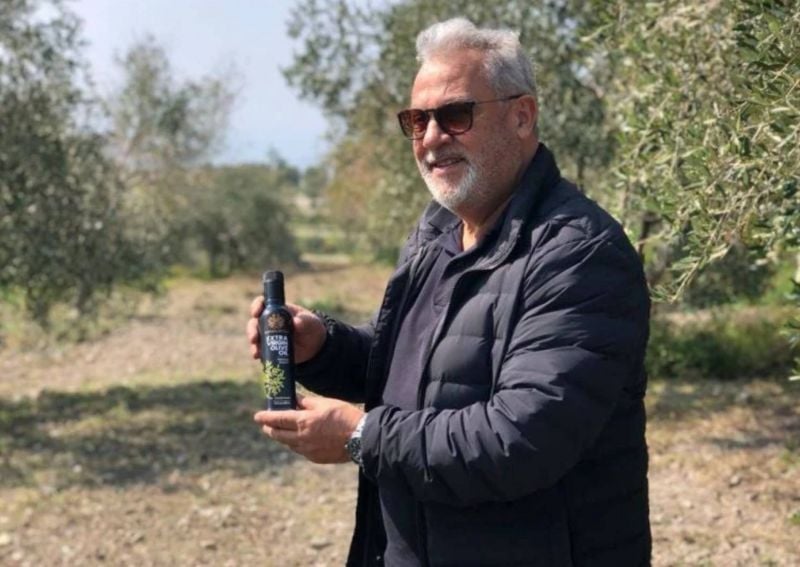
Engineer Walid Mouchantaf, founder of Bustan el-Zeitun. (Credit: All rights reserved)
Nestled amidst fig trees, orange trees, thyme, and Damascus roses, nearly half of the 500,000 square meters of fertile land owned by Lebanese engineer Walid Mouchantaf is planted with olive trees.
Within the flourishing orchards, an impressive yield of approximately 25 tons of olive oil is extracted each year, equivalent to 50,000 bottles of 500 milliliters each.
Bustan el-Zeitun, perched on the hills of Saida in the town of Aabra, is more than an agricultural land. It is a garden of delightful Mediterranean aromas, nurturing a diverse array of olive tree varieties sourced from Lebanese, Sicilian, Tuscan, soils, among others.
The virgin olive oil produced by this passionate entrepreneur has captured headlines on several occasions.
Since its inception in 2017, Bustan el-Zeitun has won over 20 awards. This year alone, it won three international prizes, including two gold medals in Japan and New York, and ranked in the top 100 best virgin olive oils worldwide in Spain. Results from a fourth competition in Italy are forthcoming.
“Nature is generous. You give it so little, it gives back a hundredfold,” says Mouchantaf, a father of three. He adds that his children will “take over” the family business in due course.
In the meantime, Mouchantaf’s eldest son manages the company’s finances and the youngest is preparing Bustan el-Zeitun’s next agri-tourism project.
“Families and tourists will be able to come and visit our space and taste our production,” Mouchantaf says enthusiastically. For him, this is the culmination of a mission he embarked on back in 1995, when he decided to return to his homeland and commit to rebuilding his parents’ village “socially and economically” after long years of civil war.
Strong but healthy local competition
For Mouchantaf, who once served as the mayor of Aabra, it all started in 2008.
“I made an agreement with the village church, which owned a deserted piece of land,” he recounts.
It took him three years to clear the land and prepare it for the planting of olive trees in 2011, and then another six years before the first olive harvest and oil production in 2017.
“Everything was done in consultation with local and Italian experts and scientists,” says Mouchantaf.
“To ensure the best quality of the product, it has to be in harmony with its environment. The right light, the vitamin content of the soil, the right agricultural practice, etc.,” he continues, adding that the harvest is done manually.
Starting from the end of September, some 75 to 80 workers for 30 to 40 days, starting at dawn, to harvest the olives, which receive year long care.
“The first [olive] flowers bud in April, and the first fruits [appear] in June,” Mouchantaf says. In the meantime, “about 30 seasonal workers work throughout the year to fertilize the land, and take care of the secondary crops,” he adds.
“Also, a group of 15 people is hired on a full or part-time basis working behind the scenes, in marketing, insurance among other tasks,” he adds, stressing that the majority of the workforce is from the surrounding area.
Since 2008, Mouchantaf estimates that he has invested “more than $3 million”in his business.
The cost includes the purchase “of a stainless-steel oil mill that meets international standards in 2019.”
“Before, we had to travel to the southern border of Lebanon for production in a mill of the same type,” he says. “Our production and sales have increased ever since.”
As for the profit margins, “they depend on the market because costs are high and we face strong but healthy, local and international competition,” he explains.
Mouchantaf exports his products mainly to the Gulf countries and Europe.
An essential part of Lebanese culture
Although the business picked up with the purchase of the mill, challenges persisted.
Mouchantaf, 66, who is also an engineer, recalls what many Lebanese have been saying since the crisis broke out nearly four years ago.
“We went back to work as if we were starting our professional lives from scratch.”
The population had to deal first with the blocked deposits, and then the informal banking restrictions that came into effect in the fall of 2019.
“Then we face the water, electricity and fuel shortages, which were real hardships and we had to find quick solutions to cope,” Mouchantaf said.
It was not long before the COVID-19 pandemic broke out, which took a heavy toll on Bustan el-Zeitoun. “Our sales dropped after many hotels and restaurants closed their doors,” Mouchantaf explains.
However, while the economic and financial crisis drags on in the country, part of the population and the private sector have recovered or managed to adapt.
“The crisis has created an opportunity: to finally address the importance of the agri-food industry in Lebanon and of agriculture in general,” Mouchantaf says.
He also lists several private initiatives that have emerged in recent years, in particular the QOOT Agri-Food Innovation Cluster acceleration program launched at the beginning of 2019 by the Berytech incubator and the Netherlands, which works on the promotion and innovation of Lebanon’s agri-food sector.
But beyond the country’s hardships, Mouchantaf believes that olives and olive oil remain “an essential part of Lebanese culture,” and this is why Bustan el-Zeitun continues to actively participate in international competitions in this field.
“It allows us to be part of this international community” for a highly competitive field just like the wine domain. With Bustan el-Zeitun, “we are recognized on such scale and we raise Lebanon to the rank of the best olive oil producers in the world.”
This article was originally published in French in L'Orient-Le Jour. Translation by Sahar Ghoussoub.
- A culinary journey from Beirut to Brussels cooks up tradition, love and teta's recipes
- In Tripoli’s Bab al-Tabbaneh and Jabal Mohsen, ex-rival fighters light up former frontlines with solar energy
- Savvy Element: Finding a niche in the local self-care and home-care market, despite Lebanon’s crisis